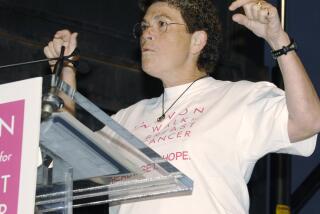UCI Researcher’s Interest Goes Beyond Training : Cancer: ‘I’ve been through it,’ she says of her battle with the disease. She created a landmark cancer monitoring program.
- Share via
IRVINE — Hoda Anton-Culver, one of the three UCI researchers whose study supporting breast-conserving surgery for cancer are in the international spotlight today, has an interest in the disease that goes far deeper than her medical training.
“I have been through it,” said the 52-year-old woman.
Three years ago, the Egyptian-born epidemiologist detected cancer in her breast and had to make her own decisions about surgery.
“The most depressing thing is not getting information that will help you,” she recalled Tuesday. She hopes studies like the one she co-authored, which was published today in the Journal of the American Medical Assn., will help women with cancer make those important choices.
Anton-Culver’s academic interest in cancer spans her entire career. Educated in cancer epidemiology, immunology and genetics at St. Andrews University in Scotland, she taught at McGill University in Montreal and Creighton University in Nebraska before coming to UCI College of Medicine in 1978.
At UCI, she established the medical school’s epidemiology program, then in 1984 she created a landmark cancer monitoring program for Orange County under a new state law. Information collected by this registry, which records diagnostician procedures and treatments and follows cancer patients until death, provided the data used in the breast cancer study.
The Orange County registry served as a model for the statewide cancer registry program, which has 12 reporting regions statewide. Today, hospitals and doctors statewide are required to report all cancers to their respective registries. The Orange County registry has been expanded to include San Diego and Imperial counties. Anton-Culver said 19,000 to 20,000 new cancers each year are reported to the three-county registry.
Pointing with pride to the registry and its vast storehouse of information, Anton-Culver said she hopes to use this data to discover the causes of breast cancer and find treatments that may increase survival rates.
“I got interested in breast cancer because it is a major problem for the nation and for Orange County in particular, which has the highest breast cancer rate in the nation,” she said. “And I am interested in (breast cancer) because it is on the rise and we don’t know why.”
The lead author of the JAMA article, Anna Lee-Feldstein, was invited by Anton-Culver to join the epidemiology program in 1990.
“I do the number crunching,” said Lee-Feldstein, who is trained as a bio-statistician and who worked previously at the University of Michigan’s School of Public Health.
Her husband, Paul J. Feldstein, a professor in the UCI Graduate School of Management and the third author on the JAMA article, said the couple decided to collaborate because they wanted to merge their diverse professional interests.
“Anna and I were thinking of pulling together the things we were interested in,” he said. “She was interested in epidemiology and I was interested in health-care delivery systems.”
Feldstein, 60, who has a doctorate in economics from the University of Chicago and wrote a popular textbook called “Health Care Economics,” was recruited by UCI seven years ago.
Among other things, the breast cancer study found that patient treatment and survival rates were best at large hospitals and poor at at HMO hospitals. With the growth of HMOs and other managed care systems to contain medical costs, Feldstein said, “I think the future is for people to request from their managed care organizations the kind of outcome measures we talk about in the paper.”
All three authors of the breast cancer study expressed amazement at the national attention their work has attracted.
“I have had publications before and never this kind of publicity associated with them,” said Lee-Feldstein.
She noted that the excitement stems from the timing of the publication, which comes amid a controversy about the falsification of results in another major breast cancer study. The falsification of data in that international study called into question its conclusions, which generally advocated lumpectomy for treatment over mastectomy.
The UCI study bolsters confidence in the less radical, breast-conserving procedure.
Of course, Lee-Feldstein said, she and her colleagues had no idea this would happen when they completed their study last summer and submitted it to JAMA in hope that it would be published. Today it is the magazine’s lead article.
“It is probably an accident of history,” she said.






